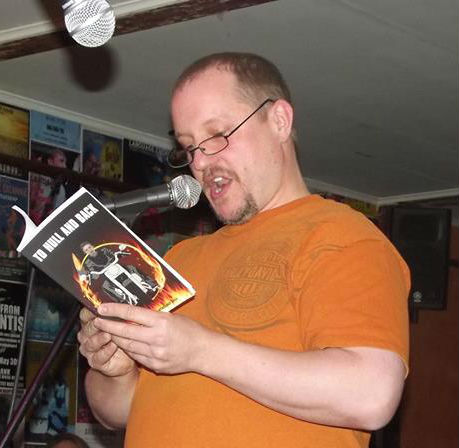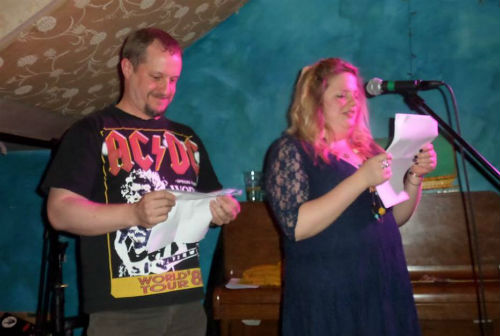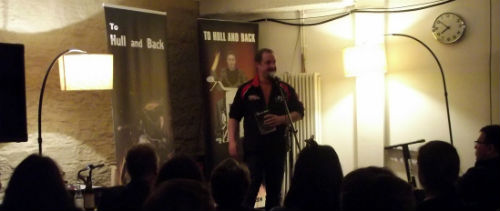Writing Advice:
Quick links on this page:
Short story reading events are becoming more and more popular. This means there are lots of opportunities for writers to perform, reading short stories to an audience. As a writer, you can learn a lot and gain valuable experience from attending these types of event.
It’s also a very pleasant way to spend an evening if you’re a reader or simply like listening to stories.

Chris Fielden, reading at the Bristol Festival of Literature
There are a number of ways that attending short story reading events can help your writing. You get to:
Let’s look at them individually.
‘Read a lot’ is a common piece of advice for writers. And for good reason. You can learn a lot by reading other writers’ work.
The same can be said for listening. Watching other writers perform their stories can be inspirational. You can also learn a lot.
When you attend this kind of event, enjoy it, but also ask yourself questions:
I attend reading events regularly and learn a lot from them. You can determine new techniques and apply them to your own writing. Utilising different approaches that are proven to work in front of an audience can only help your writing improve.

Chris Fielden & Mel Ciavucco, performing at Talking Tales, a reading event in Bristol
When reading your stories out loud, learn from the audience’s reaction. I’ve found this very useful with my writing. As I write humour, it’s very interesting to see when people laugh. And when they don’t.
Often, the bits I think are hilarious might rouse a murmur of laughter from the audience. The bits they really laugh at are often unexpected.
It’s not just laughs I look for. It’s engagement. Do I have the audience’s attention? Often people are very courteous and supportive at these types of event, but you should still glance up from your manuscript when you can and observe the crowd.
If the audience are not engaged, ask yourself why and then so something about it. Edit your story and improve it. Reduce or remove passages that are too long and boring. Make changes to dialogue to make it more natural and believable.
Often, by making some simple changes, you can greatly improve your work.
I read at a lot of local events and get quite nervous, so I sometimes find it difficult to pay attention to everything when I'm reading as I’m concentrating on what I'm doing. Therefore, I record the performance and listen back to it afterwards.
Sometimes the event organisers will make a podcast, but you can just use your phone to record the reading and then you can hear the audience’s reaction on that afterwards if you want to analyse it.
Or film it. You can do this on most modern phones. Just set the camera up beforehand and unobtrusively point it at the audience. Or ask a friend to record your reading for you.
If you read a story at an event, you need to perform it. Simply reading it aloud isn’t enough. You need to inject some life into the words and create an entertaining and engaging performance for the crowd.
For example, when I perform my work, I try and do different voices for all the characters. I find it helps to bring the charaters to life and audience’s like it - they listen more carefully to what I’m saying.
An example can be seen in the video below. This performance was recorded at the Bristol Festival of Literature where I had the honour of closing the event with my short story ‘Death of a Superhero’. Take note of the different voices I use and listen to the audience’s reaction throughout.
‘Death of a Superhero’, a short story performed by Chris Fielden
When I initially wrote this story, I thought the descriptions of Doris were the most amusing part of the story. However you will see that the most laughter occurs after some of the dialogue. Why? I don’t know. Honestly. You tell me. Was it the way I performed the story, or was it what the characters were saying?
Either way, I think the reading illustrates the value of performing at this kind of event and what you can learn from it.
Below is another video. This is a performance of a story called ‘Zombies on a Boat’ written by Mel Ciavucco. I performed it with her at the first Talking Tales event in Bristol. This is a good example of how a strong performance can win an audience over.
‘Zombies on a Boat’, short story performed by Mel Ciavucco and Chris Fielden
This story is quite risqué and pushes the boundaries with its use of language and subject matter - not everyone will like it as the story contains quite a lot of profanity. However, as it satirises certain genres of story, writers, B movies and itself, I feel it isn’t gratuitous. It takes the piss remorselessly which is why, in my opinion, it works.
Whether the story is to your taste or not, listen to the reaction of the audience. The story takes risks and that entertained the crowd. By reading the story to an audience, Mel learnt that the story is strong and, while some might find it distasteful, it would entertain a certain type of audience.
Both the stories above are available to buy, alongside many other fine short stories, in the first To Hull & Back Anthology.
Getting nervous before you read at an event is normal. I simply advise that you don't allow nerves to stop you from performing.
I’ve been fortunate enough to perform many times as a musician (I play drums in rock bands – you can learn more about that in the music section of the site if you’re interested). But playing as part of a band is very different to standing up in front of an audience on your own and speaking. I do get nervous.
Luckily, the writing community are generally very friendly and encouraging, so I’ve always felt secure performing. Once you start reading, you often find the nerves dissipate and you start enjoying yourself. As you perform more frequently, you learn to deal with feeling nervous. I wouldn't say the feeling goes away - you just learn how to handle it better.
Opportunities can arise from attending reading events.
For example, I’ve met a lot of writers, event organisers, learnt about many writing groups, performance reading events (for stories, novels, poetry, scripts, plays – all manner of things), conventions for different genres of fiction, writing competitions etc. at reading events.
I’ve been invited to attend/perform at other events, contribute to magazines, be interviewed and met some wonderful people by attending events. And I’ve had the pleasure of listening to a lot of fabulous authors perform their work.
Attending events and talking to people can only open doors for your writing.
I belong to Stokes Croft Writers, a writing group based in Bristol in the UK. We run a bi-monthly event called Talking Tales.
Everyone is welcome to come along. You can learn about Talking Tales dates on my About page, my SCW page or the Stokes Croft Writers website. The About and SCW pages also contain videos of the full podcasts from the events.
If you live elsewhere in the world, you just need to find events run locally:
Lots of short story competitions launch anthologies containing the award winning stories. The competition administrators will often organise an event to launch the anthology. By entering competitions, you give yourself a good chance of being invited.
For example, I run an annual humorous short story competition called To Hull & Back. I put on a book launch every year and invite everyone who entered. I also recently attended the Bath Short Story Award anthology launch at a book shop in Bath.

Chris Fielden, speaking at the second To Hull & Back anthology book launch party
These events are really entertaining. Attending them means you get to hear some wonderful stories and meet some lovely people.
If you want to learn about more short story competitions, see my writing competition lists.
Below are some useful links to a few reading event calendars.
If the writing advice and tips included in the post above were beneficial to you, you'd probably like my book. It's called ‘How to Write a Short Story, Get Published & Make Money’ and uses my own published short stories as case studies, showing the reader how the advice in the book was used in real life to achieve publishing success.
Shirley M
Thanks for this, Chris. It's something I've been wanting to do for a while. Now I'm going to ask some of my writing friends and just do it. I read a lot of short stories but there is a difference in listening to them being performed. I wish I lived near Bristol, but I'm sure Edinburgh will have something to offer. Off to google now!
Thanks for this post, it's a great topic to cover.
Chris Fielden
Thanks Shirley :-)
It would be a bit of a trek from Edinburgh... I'm sure you'll find something locally. There's a lot of creativity in your city. I would imagine there would be reading events as part of the Edinburgh Fringe?
Steph M
Thanks Chris. That was a very interesting and informative post.
Maris M
Reading one’s story aloud is incredibly useful, as I discovered when reading one of mine to a group and realised that there was a big block that had no relevance and should be cut. I skipped over it and was rewarded by applause.
When I was polishing the story I’ve submitted to the Jeremy Mogford prize I made sure I read it aloud, if only to myself, and was able to see flaws in the rhythm that I think I’ve fixed. Fingers crossed on that one!
Chris Fielden
Hi Maris - I couldn't agree more. I also read aloud to myself
while editing stories. My neighbours probably think I'm insane, but it certainly works. Like you say, it highlights all sorts of potential problems in rhythm, pace, dialogue etc. so is very useful and a great practice to get into.
I wish you the best of luck with the Jeremy Mogford prize :)
Maris M
Thanks, Chris. I only found out about the Mogford prize through your website, so thanks for that, too. And fingers still crossed (makes it hard to type!)
Scott S
Hi Christopher, I loved your Batman short story.
Chris Fielden
Thanks, Scott. Glad to hear you enjoyed it :-)
Ibe O
Hi Chris, I've just noticed that your short story 'Death of a Superhero' is the title of an Irish movie made in 2011 and based on a novel of the same name by a New Zealand writer, Anthony McCarten. Was this deliberate or just an accident on your part?
Chris Fielden
Hi Ibe. That is complete coincidence – I didn’t know there was a book or film of that name. I’ll go and look it up :-)
Mirry A
Thank you, sir, this post really helps.
Chris Fielden
No problem, Mirry. Glad you found the advice helpful :-)
Leave your comments
Please use the form below to leave your comments. All comments will be reviewed so won't appear on the page instantly. I will not share your details with anyone else. Most recent comments appear at the bottom of the page, oldest at the top.